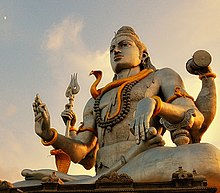
Back Shiva Afrikaans Shiva ALS Śiva AN शिव ANP شيفا Arabic شيڤا ARZ শিৱ Assamese Shivá AST शिव AWA Şiva Azerbaijani
| Shiva | |
|---|---|
God of Destruction
| |
| Member of Trimurti | |
 Statue of Shiva, Murudeshwara Temple, Karnataka | |
| Other names | |
| Affiliation |
|
| Abode | |
| Mantra | |
| Weapon | |
| Symbols | |
| Day | |
| Mount | Nandi[4] |
| Festivals | |
| Personal information | |
| Consort | Parvati/Sati[note 1] |
| Children | |
Shiva (/ˈʃɪvə/; Sanskrit: शिव, lit. 'The Auspicious One', IAST: Śiva [ɕɪʋɐ]), also known as Mahadeva (/məˈhɑː ˈdeɪvə/; Sanskrit: महादेव:, lit. 'The Great God', IAST: Mahādevaḥ, [mɐɦaːd̪eːʋɐh)[9][10][11] or Hara,[12] is one of the principal deities of Hinduism.[13] He is the Supreme Being in Shaivism, one of the major traditions within Hinduism.[14]
Shiva is known as The Destroyer within the Trimurti, the Hindu trinity which also includes Brahma and Vishnu.[2][15] In the Shaivite tradition, Shiva is the Supreme Lord who creates, protects and transforms the universe.[9][10][11] In the goddess-oriented Shakta tradition, the Supreme Goddess (Devi) is regarded as the energy and creative power (Shakti) and the equal complementary partner of Shiva.[16][17] Shiva is one of the five equivalent deities in Panchayatana puja of the Smarta tradition of Hinduism.[18]
Shiva has many aspects, benevolent as well as fearsome. In benevolent aspects, he is depicted as an omniscient Yogi who lives an ascetic life on Mount Kailash[2] as well as a householder with his wife Parvati and his two children, Ganesha and Kartikeya. In his fierce aspects, he is often depicted slaying demons. Shiva is also known as Adiyogi (the first Yogi), regarded as the patron god of yoga, meditation and the arts.[19] The iconographical attributes of Shiva are the serpent king Vasuki around his neck, the adorning crescent moon, the holy river Ganga flowing from his matted hair, the third eye on his forehead (the eye that turns everything in front of it into ashes when opened), the trishula or trident as his weapon, and the damaru. He is usually worshipped in the aniconic form of lingam.[3]
Shiva has pre-Vedic roots,[20] and the figure of Shiva evolved as an amalgamation of various older non-Vedic and Vedic deities, including the Rigvedic storm god Rudra who may also have non-Vedic origins,[21] into a single major deity.[22] Shiva is a pan-Hindu deity, revered widely by Hindus in India, Nepal, Bangladesh, Sri Lanka and Indonesia (especially in Java and Bali).[23]
| Part of a series on |
| Shaivism |
|---|
 |
|
|
- ^ "Hinduism". Encyclopedia of World Religions. Encyclopaedia Britannica, Inc. 2008. pp. 445–448. ISBN 978-1593394912.
- ^ a b c Zimmer 1972, pp. 124–126.
- ^ a b c Fuller 2004, p. 58.
- ^ Javid 2008, pp. 20–21.
- ^ Dalal 2010, pp. 137, 186.
- ^ Cush, Robinson & York 2008, p. 78.
- ^ Williams 1981, p. 62.
- ^ Kinsley 1998, p. 35.
- ^ a b Sharma 2000, p. 65.
- ^ a b Issitt & Main 2014, pp. 147, 168.
- ^ a b Flood 1996, p. 151.
- ^ Sharma 1996, p. 314.
- ^ "Shiva In Mythology: Let's Reimagine The Lord". 28 October 2022. Archived from the original on 30 October 2022. Retrieved 30 October 2022.
- ^ Flood 1996, pp. 17, 153; Sivaraman 1973, p. 131.
- ^ Gonda 1969.
- ^ Kinsley 1988, pp. 50, 103–104.
- ^ Pintchman 2015, pp. 113, 119, 144, 171.
- ^ Flood 1996, pp. 17, 153.
- ^ Shiva Samhita, e.g. Mallinson 2007; Varenne 1976, p. 82; Marchand 2007 for Jnana Yoga.
- ^ Sadasivan 2000, p. 148; Sircar 1998, pp. 3 with footnote 2, 102–105.
- ^ Flood 1996, p. 152.
- ^ Flood 1996, pp. 148–149; Keay 2000, p. xxvii; Granoff 2003, pp. 95–114; Nath 2001, p. 31.
- ^ Keay 2000, p. xxvii; Flood 1996, p. 17.
Cite error: There are <ref group=note> tags on this page, but the references will not show without a {{reflist|group=note}} template (see the help page).
© MMXXIII Rich X Search. We shall prevail. All rights reserved. Rich X Search